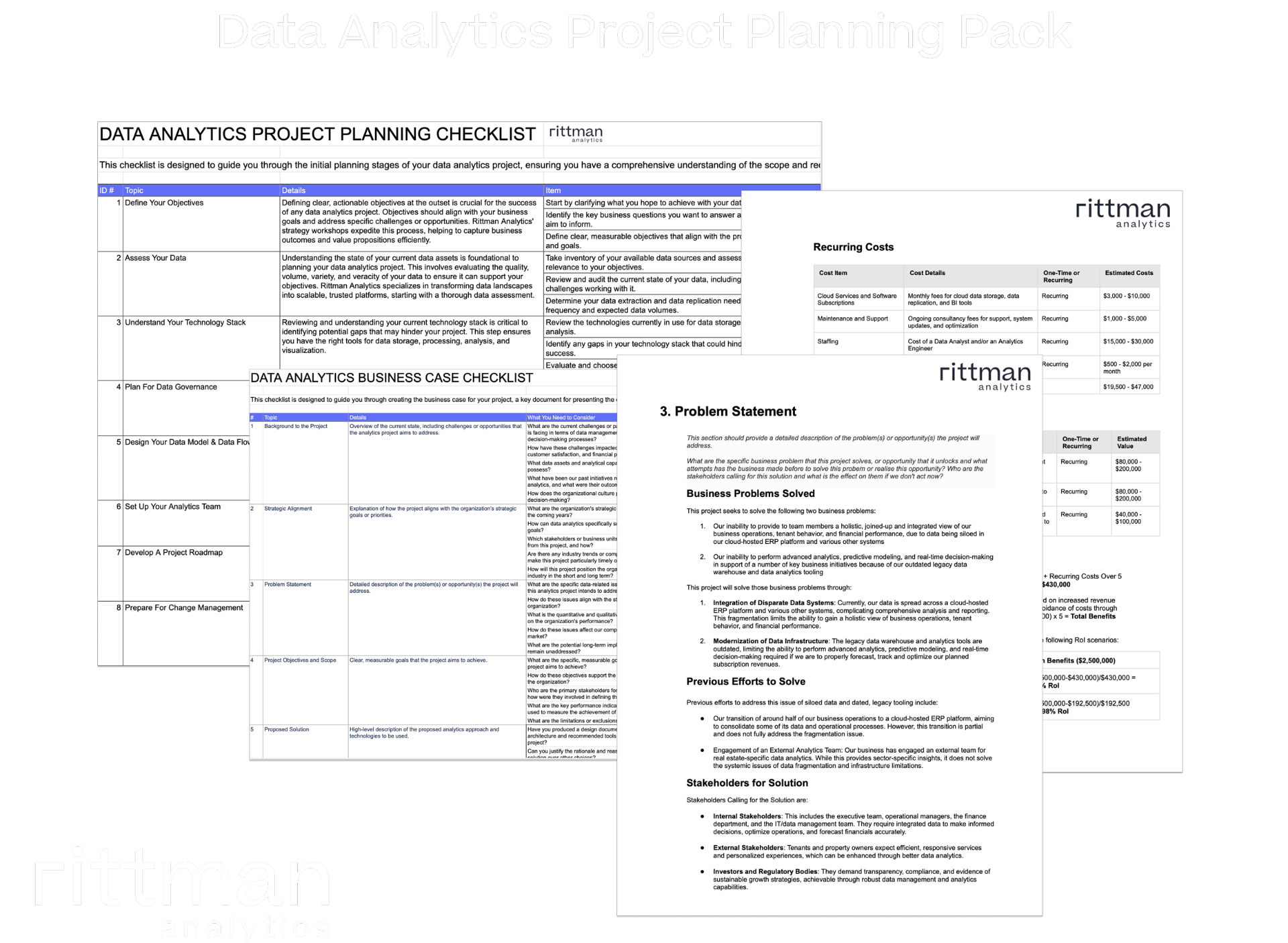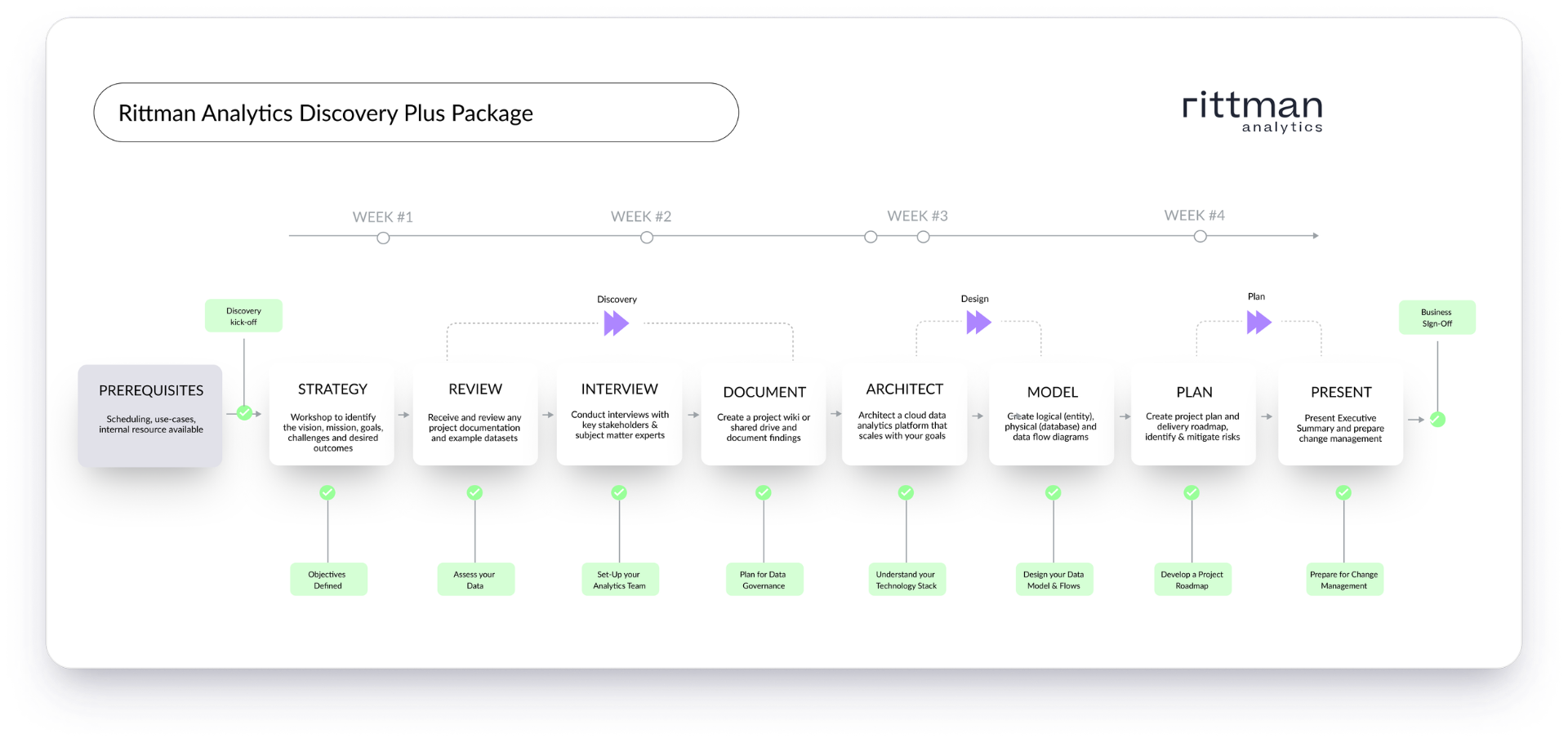Data Analytics Project Planning Checklist:
The Definitive Guide To Planning Your Data Analytics Initiative
Coming up with a project planning checklist for your data analytics project is one of the most challenging tasks, particularly for the uninitiated.
To help you, we've compiled a list of 'must-do' activities that we've found are essential to successfully scoping, defining, designing and planning a data analytics project.
Get a free checklist toolkit: Project Planning Checklist + Example Business Case
Serious about delivering a successful data analytics project?
Download the exact data analytics project checklist toolkit we use on client engagements and learn advanced tactics for data analytics project planning.
Toolkit includes:
✅ Data Analytics Project Planning Checklist Spreadsheet (for Excel/Google Sheets)
✅ Data Analytics Business Case Preparation Spreadsheet (for Excel/Google Sheets)
✅ Pre-populated Example Data Analytics Business Case (for MS Word/PDF viewer)

Data Analytics Project Planning Checklist
This checklist is designed to guide you through the initial planning stages of your data analytics project, ensuring you have a comprehensive understanding of the scope and requirements. Rittman Analytics can support you at every step, leveraging our Discovery Framework to guarantee the success of your project.
1. Define Your Objectives
Defining clear, actionable objectives at the outset is crucial for the success of any data analytics project. Objectives should align with your business goals and address specific challenges or opportunities. Rittman Analytics' strategy workshops expedite this process, helping to capture business outcomes and value propositions efficiently.
Start by clarifying what you hope to achieve with your data analytics project.
Identify the key business questions you want to answer and the decisions you aim to inform.
Define clear, measurable objectives that align with the project's overall vision and goals.
2. Assess Your Data
Understanding the state of your current data assets is foundational to planning your data analytics project. This involves evaluating the quality, volume, variety, and veracity of your data to ensure it can support your objectives. Rittman Analytics specializes in transforming data landscapes into scalable, trusted platforms, starting with a thorough data assessment.
Take inventory of your available data sources and assess their quality and relevance to your objectives.
Review and audit the current state of your data, including any limitations or challenges working with it.
Determine your data extraction and data replication needs, including replication frequency and expected data volumes.
3. Understand Your Technology Stack
Reviewing and understanding your current technology stack is critical to identifying potential gaps that may hinder your project. This step ensures you have the right tools for data storage, processing, analysis, and visualization.
Review the technologies currently in use for data storage, processing, and analysis.
Identify any gaps in your technology stack that could hinder your project's success.
Evaluate and choose a cloud data warehouse that suits the use-cases and types of data that your project will need to handle.
4. Plan for Data Governance
Plan for and understand the importance of establishing clear policies and roles for data management to ensure security, quality, and compliance.
Establish clear data governance policies to ensure your data remains secure, compliant, and of high quality.
Define roles and responsibilities around data management and usage.
Create a governance framework that supports scalable and trusted data platforms.
5. Design Your Data Model & Data Flows
An effective data model is foundational to any analytics project. It should be designed to support your objectives, ensuring performance, scalability, and data quality. Rittman Analytics' Discovery Framework includes a design phase focused on creating an optimal information architecture that meets these criteria.
Create an initial logical entity model that defines key activities, actors and actions within the scope of your project.
Design a physical data model for your chosen cloud data warehouse that consider scalability and performance from the start.
Map-out your planned data flows, data transformations and define your testing strategy.
6. Set Up Your Analytics Team
Building a capable analytics team is critical to the success of your data analytics project. This team should possess a mix of technical, analytical, and business skills to cover the entire spectrum of data analytics functions—from data engineering and data science to business analysis and project management
Identify the roles and expertise required to deliver your project.
Assess your team's current capabilities and identify any skill gaps.
Find a delivery partner who can provide access to specialized skills and experiences and accelerating your project's success.
7. Develop a Project Roadmap
A detailed project roadmap is essential for guiding the strategic execution of your data analytics project and should outline key milestones, delivery timelines, and the agile iterations needed to achieve your objectives. It serves as a blueprint for project execution, offering a clear path from inception to completion.
Outline the major milestones, timelines, and agile iterations for your project.
Create a communications plan for stakeholders along with a schedule for regular project update meetings.
Identify risks that could delay or threaten delivery of the project, record in a risk register and develop mitigations to address those risks.
8. Prepare for Change Management
Your plan should aim to align the organization's culture and workflows with the new analytics capabilities, minimizing resistance and maximizing adoption.
Anticipate how the introduction of new tools, processes, and data models will impact your organization.
Develop a comprehensive change management plan to ensure a smooth transition.
Ensure your team is fully onboarded and aligned with the project's vision and objectives.
Do you need help with your data analytics project planning?
Our Data Analytics Project Discovery Framework aims to provide long-term cost and time savings through an upfront investment in strategy and design, minimizing iteration cycles and delivering tangible business outcomes.
It focuses on understanding and structuring strategy, conducting discovery to transform needs into empirical evidence, designing optimal information architectures and data models, and delivering a concise executive summary and agile roadmap for implementation.

Intended to align the data strategy with business vision, it ensures designs and models are in place for execution, and setting a realistic and deliverable roadmap.